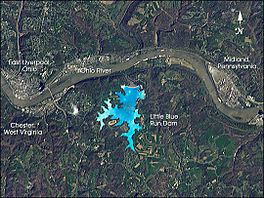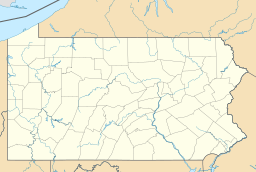Little Blue Run Lake facts for kids
Quick facts for kids Little Blue Run Lake |
|
|---|---|

NASA image of Little Blue Run from 2002
|
|
| Location | Pennsylvania, West Virginia |
| Coordinates | 40°37′32″N 80°30′47″W / 40.62556°N 80.51306°W |
| Lake type | artificial lake |
| Basin countries | United States |
Little Blue Run Lake or Little Blue Run is the largest coal ash impound in the United States. FirstEnergy owns the site, located in Western Pennsylvania and parts of the Northern Panhandle of West Virginia, and has disposed of billions of gallons of coal waste into the body of water. Several court cases have been brought against the company as a result of the damage caused by the company's practices at the site.
Description
The artificial lake was completed in 1975 and is located in both Beaver County, Pennsylvania and Hancock County, West Virginia and is owned by FirstEnergy, a publicly traded company with assets worth $48 billion in 2010. Before Little Blue Run Lake was created, the power company told local residents that the project would create a local recreational and boating area. The lake covers 1,900 acres (770 ha) and the waste in the lake is prevented from escaping thanks to a 400-foot (120 m) tall, 2,200-foot (670 m) wide rock-and-earth dam. The dam containing Little Blue Run Lake has been given a designation of "high hazard", meaning, there would be harm or loss of life if the structure were to fail. Some of the natural valleys in the area were filled with a coal ash slurry and held in place by one of the nation's largest high hazard dams. Coal slurry from Bruce Mansfield Power Plant in Shippingport was piped into the lake. This same coal slurry is piped into the lake via a seven-mile long pipeline.
Toxic waste and risks
The lake contains 20 billion US gallons (7.6×1010 litres; 1.7×1010 imperial gallons) of coal ash and smokestack scrubber waste. The northern coast of the lake is only a few hundred meters from the Ohio River, which is the drinking water source for more than three million people.
The Pennsylvania Department of Environmental Protection (PADEP) estimates that if the dam failed it would affect 50,000 people and has mandated that coal ash cannot be added to the lake after 2016. In 2015, Vice News reported that dangerous pollutants were leaking from the body of water into the local community.
The Little Blue Run Coal Ash Impoundment is unlined and has over time leaked pollution into the local ground and surface water, which local families rely on for consumption, cooking, and bathing. Some local residents worry for their health because of this pollution. In addition to the water concerns, families living near the site worry about toxic dust and complain of a strong rotten egg smell from hydrogen sulfide (H
2S).


